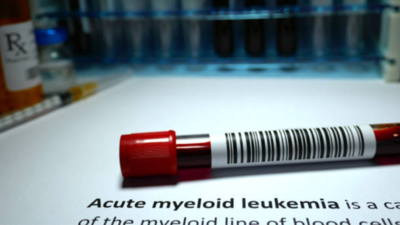- News
- lifestyle
- health-fitness
- health-news
- How does Acute Myeloid Leukemia affect mental health and emotional well-being in patients?
Trending
How does Acute Myeloid Leukemia affect mental health and emotional well-being in patients?
The journey of fighting Acute Myeloid Leukemia (AML) in India encompasses severe physical and emotional challenges for both patients and caregivers. Integrating mental health support into cancer care, along with government initiatives and NGO efforts, is crucial for comprehensive treatment and improved outcomes.
It often starts with something small. A little tiredness that won’t get better, bruises that appear out of nowhere, a fever that lingers. You may tell yourself it’s nothing—just stress, maybe a vitamin deficiency. Then, a doctor’s visit turns into a series of urgent tests. Before you can catch your breath, you hear the words, “You have blood cancer, a particularly aggressive kind called Acute Myeloid Leukemia.” In an instant, everything changes.
For many patients in India, the diagnosis isn’t just about fighting cancer, it is also about an emotional storm. While doctors focus on survival rates and treatment plans, the crushing anxiety, the sleepless nights, and the silent breakdowns are something no one talks about. However, mental health is just as important as physical recovery in the fight against AML. How do you stay strong during this journey?
Mental and emotional challenges
AML progresses quickly, often requiring urgent hospitalization. Patients have little time to prepare themselves mentally before being thrown into an aggressive treatment cycle. This abrupt shift leads to emotional distress, leaving them struggling to process the diagnosis.
Apart from the patients, caregivers bear an invisible burden. In India, family members—especially spouses and parents—take on the responsibility of providing emotional and financial support for those battling the condition. Many struggle with feelings of helplessness, guilt, and exhaustion, as they juggle caregiving with their personal and professional lives. Financial stress also puts a strain on relationships, leading to tension within families.
Additionally, due to their weakened immunity, patients with AML are advised to avoid crowded places, reducing their social interactions significantly. They may feel disconnected from their friends and communities, which leads to loneliness and a sense of being cut off from the outside world.
Despite these aspects, mental health remains a neglected aspect of cancer care in India, due to lack of awareness and resources. Many hospitals do not have dedicated psycho-oncology support, leaving patients and caregivers without professional help to navigate their emotions. Studies suggest that undiagnosed depression and anxiety in cancer patients can negatively impact treatment outcomes, making it critical to address this gap.
Supportive services for mental well-being
Government initiatives: The government has taken steps to improve cancer care and mental health services. Under the Ayushman Bharat scheme, cancer treatment has been made more accessible to economically disadvantaged patients. Additionally, the National Mental Health Programme (NMHP) aims to provide mental health services at the primary healthcare level. However, there is still a long way to go in integrating mental health support into cancer care.
Role of psycho-oncology and counselling: Psycho-oncology, which focuses on the psychological impact of cancer, is gaining recognition in India, with several institutes offering specialised courses. Moreover, hospitals have started incorporating psycho-oncology services, offering counselling and mental health interventions to patients and caregivers. Comprehensive adoption of such services can ensure that emotional well-being is a part of the treatment plan.
NGOs and support groups: Several organizations in India are working to bridge this gap. For instance, the Indian Cancer Society runs helplines and support groups for patients and caregivers. Online platforms and some pay-for-service initiatives, are also available to address this growing need.
Stress management techniques: Incorporating mindfulness, meditation, and relaxation techniques into daily routines can help manage stress. Practices like deep breathing exercises, guided meditation, and journaling have been shown to reduce anxiety and improve overall well-being.
Healing mind and body
Cancer treatment should not just focus on eliminating the disease—it should heal the whole person. A cancer diagnosis brings not just physical challenges but also deep emotional stress for both patients and their loved ones. From treatment to survivorship and even end-of-life care, mental well-being is just as important as medical treatment. Cultural beliefs often shape how people cope and what kind of support they seek. A strong support system, early mental health screening, and access to counselling can help patients and caregivers navigate this journey with resilience and hope.
In India, access to such support is still limited, but it is time to make mental and emotional care a core part of cancer treatment. With more awareness and better integration of mental health services, India can move toward a more holistic approach to treating AML and other cancers. Let’s break the stigma, embrace holistic care, and ensure that no one fights cancer alone.
Dr Subhaprakash Sanyal, MD, DM (Hematlogy), Consultant Hematologist & Director of Hematology and Bone marrow transplant unit, Fortis Hospital, Mumbai
End of Article
FOLLOW US ON SOCIAL MEDIA
Visual Stories
Tired of too many ads?go ad free now











